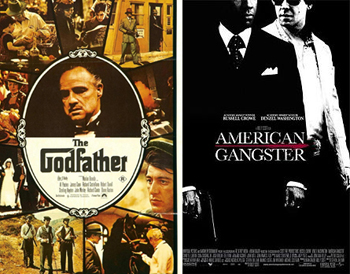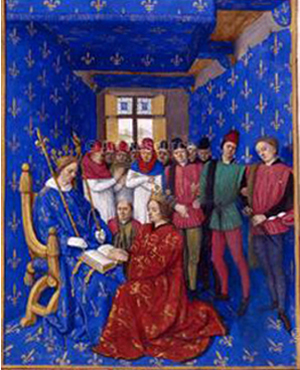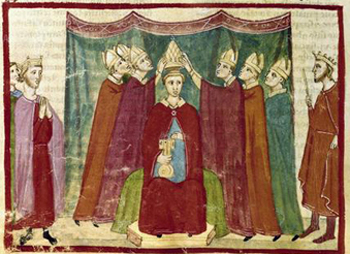Organic Society
 |
 |
 |
 |
 |
 |
 |
Contracts & Honor - IV
Admiration for Shrewdness Killed
Honor’s Hegemony
There is a sentiment that is opposed to honor: it is the idolatry of shrewdness. When a person or an epoch starts to admire shrewdness as the highest ideal of a man, honor starts to be despised.
 Today this is commonplace: everywhere we see admiration for the dishonest man who succeeded in business. On the contrary, we witness a general disdain of the man of honor who worked honestly but made just enough money to live. He is considered a “dupe,” while the dishonest man is applauded as a “shark.”
Today this is commonplace: everywhere we see admiration for the dishonest man who succeeded in business. On the contrary, we witness a general disdain of the man of honor who worked honestly but made just enough money to live. He is considered a “dupe,” while the dishonest man is applauded as a “shark.”
Along the same lines, we find admiration for spies and secret agents who lie and betray their countries as part of their jobs. They are wrongly presented as heroes who stand above the laws of honor and morals. Also, gangsters are admired: “He was a bandit, but what a great man!” This explains the success of novels and films on secret agents and gangsters.
This idolatry of fraudulent shrewdness and a corresponding disdain for the honest man who is not successful in business are typical of decadent epochs.
In the West this started when the Middle Ages reached its decline and absolutist kings appeared such as Philip IV of France or, later, Louis XI. Kings who completely disregarded their word of honor; further, they chose to make it a point of glory to not honor their word.
 Philip IV was an absolutist King who provides an example of such “successful” dishonor. We see this in the incident where he dealt with Edward I of England. Due to matters of succession, Edward I became the vassal of the King of France as Duke of Aquitaine. As a Duke in France, Edward had many French cities under his domain.
Philip IV was an absolutist King who provides an example of such “successful” dishonor. We see this in the incident where he dealt with Edward I of England. Due to matters of succession, Edward I became the vassal of the King of France as Duke of Aquitaine. As a Duke in France, Edward had many French cities under his domain.
Philip IV arranged a meeting with Edward I in Amiens, announcing to Edward his intention to make spectacular concessions to him. Edward found the proposal interesting and ordered the cities of Bordeaux and Bayonne - which were along the road to Amiens - to open their doors to receive the troops of the King of France as he passed.
Once the troops were inside these cities, however, Philip IV took over them. His attractive proposal to Edward I was just bait, a lie. He never had that meeting with Edward I. The only goal of his proposal was to take possession of those cities by means of deceit. This is the way Aquitaine fell into the hands of Philip IV.
Here we see an example of abandoning one’s word of honor.
What Philip IV relied on to govern were Roman Law and royal absolutism. It was a new order of things where medieval contracts and honor lost their importance. What counted, then, was the State and strength. The King had the strength to impose order; he would make a law and everyone had to obey. And so, the concept of honor tended to lose its hegemony in society and fade away.
The Papacy lost its role as the arbiter of honor
Simultaneously, the Pope lost his role of being the central judge on questions of honor.
With the rise of secular thinking at the end of the Middle Ages, the Kings were increasingly biased against the arbitration of the Pope. We find a characteristic case with the same Kings Philip IV of France and Edward I of England.
When they had problems, they still would ask Pope Boniface VIII to be the arbiter of their cases, but they accepted Boniface VIII in this role as a person, not as a Pope. This was how the Treaty of Montreuil in 1299 was established.
It was negotiated by Boniface VIII, and its terms established that Philip IV would give the region of Guyenne as a gift to his daughter Isabel, who would marry the son of Edward I, on condition that the young Prince should hold the province as Philip’s vassal.
 So, although the treaty relied on Boniface VIII as a personal arbitrator, he had to declare that he was not acting as Pope. This is because the new mentality of the time required that the Pope be excluded from affairs of secular States.
So, although the treaty relied on Boniface VIII as a personal arbitrator, he had to declare that he was not acting as Pope. This is because the new mentality of the time required that the Pope be excluded from affairs of secular States.
Another factor that made the Pope lose his role as the arbiter of Christendom came, again, as a consequence of the evil action of Philip IV. Many historians maintain that when Bertrand de Got, Archbishop of Bordeaux, was elected Pope Clement V, he had previously made a pact of submission to Philip IV as a requirement to become Pope. We do not know for certain that this accord was made, but the events that followed his election give credibility to the hypothesis.
After the Archbishop of Bordeaux was elected, he did not even bother to travel to Rome to be crowned, but ordered this ceremony take place in Lyon, situated between Paris and Marseille. Shortly afterward, he transferred the Papacy to Avignon. This marked the beginning of the Popes in exile.
In Avignon the Pope was under the King’s control. For example, it was under the tutelage of Philip IV that Clement V convened the Council of Vienne (1311-1312), which closed the Order of the Knights Templar.
The Popes in Avignon were French, cloistered in France and obedient to its Kings. What was the result of this situation? The Pope lost his impartiality of judgment. The other countries of Christendom stopped asking the Pope to be arbiter of their cases because they suspected his sentence would favor France. This marked the end of the Pope as the main arbiter of honor in Christendom.
After the long exile of Avignon (1309-1378) ended, the Church entered the Western Schism (1378-1418). It was a turbulent period where Popes and Antipopes were fighting among themselves. Once again, the situation prevented any King from sending his causes of honor to be judged by the Pope, simply because he did not know who the true Pope was.
When the convulsions of the Western Schism ended, the germs of Protestantism were already contaminating a large part of Christendom. So, the Papacy never recovered its role of supreme arbiter.
We see, therefore, that two processes developed in parallel. On one hand, honor entered into decline as it ceased to govern the Kings and nobles. It disappeared as absolutism came to dominate the Catholic kingdoms and shrewdness became the model ideal for man.
On the other hand, the supreme tribunal of honor, which was the Papacy, also entered decline with the exile of Avignon, and, finally, the Pope lost his role as supreme arbiter as well.


Gangster and mafia chiefs are presented as heroes in popular American movies
Along the same lines, we find admiration for spies and secret agents who lie and betray their countries as part of their jobs. They are wrongly presented as heroes who stand above the laws of honor and morals. Also, gangsters are admired: “He was a bandit, but what a great man!” This explains the success of novels and films on secret agents and gangsters.
This idolatry of fraudulent shrewdness and a corresponding disdain for the honest man who is not successful in business are typical of decadent epochs.
In the West this started when the Middle Ages reached its decline and absolutist kings appeared such as Philip IV of France or, later, Louis XI. Kings who completely disregarded their word of honor; further, they chose to make it a point of glory to not honor their word.

King Edward I of England pays homage to Philip IV as a vassal for French lands
Philip IV arranged a meeting with Edward I in Amiens, announcing to Edward his intention to make spectacular concessions to him. Edward found the proposal interesting and ordered the cities of Bordeaux and Bayonne - which were along the road to Amiens - to open their doors to receive the troops of the King of France as he passed.
Once the troops were inside these cities, however, Philip IV took over them. His attractive proposal to Edward I was just bait, a lie. He never had that meeting with Edward I. The only goal of his proposal was to take possession of those cities by means of deceit. This is the way Aquitaine fell into the hands of Philip IV.
Here we see an example of abandoning one’s word of honor.
What Philip IV relied on to govern were Roman Law and royal absolutism. It was a new order of things where medieval contracts and honor lost their importance. What counted, then, was the State and strength. The King had the strength to impose order; he would make a law and everyone had to obey. And so, the concept of honor tended to lose its hegemony in society and fade away.
The Papacy lost its role as the arbiter of honor
Simultaneously, the Pope lost his role of being the central judge on questions of honor.
With the rise of secular thinking at the end of the Middle Ages, the Kings were increasingly biased against the arbitration of the Pope. We find a characteristic case with the same Kings Philip IV of France and Edward I of England.
When they had problems, they still would ask Pope Boniface VIII to be the arbiter of their cases, but they accepted Boniface VIII in this role as a person, not as a Pope. This was how the Treaty of Montreuil in 1299 was established.
It was negotiated by Boniface VIII, and its terms established that Philip IV would give the region of Guyenne as a gift to his daughter Isabel, who would marry the son of Edward I, on condition that the young Prince should hold the province as Philip’s vassal.

Clement V is crowned Pope in Avignon in the presence of King Philip IV and his brother Charles, Count of Valois
Another factor that made the Pope lose his role as the arbiter of Christendom came, again, as a consequence of the evil action of Philip IV. Many historians maintain that when Bertrand de Got, Archbishop of Bordeaux, was elected Pope Clement V, he had previously made a pact of submission to Philip IV as a requirement to become Pope. We do not know for certain that this accord was made, but the events that followed his election give credibility to the hypothesis.
After the Archbishop of Bordeaux was elected, he did not even bother to travel to Rome to be crowned, but ordered this ceremony take place in Lyon, situated between Paris and Marseille. Shortly afterward, he transferred the Papacy to Avignon. This marked the beginning of the Popes in exile.
In Avignon the Pope was under the King’s control. For example, it was under the tutelage of Philip IV that Clement V convened the Council of Vienne (1311-1312), which closed the Order of the Knights Templar.
The Popes in Avignon were French, cloistered in France and obedient to its Kings. What was the result of this situation? The Pope lost his impartiality of judgment. The other countries of Christendom stopped asking the Pope to be arbiter of their cases because they suspected his sentence would favor France. This marked the end of the Pope as the main arbiter of honor in Christendom.
After the long exile of Avignon (1309-1378) ended, the Church entered the Western Schism (1378-1418). It was a turbulent period where Popes and Antipopes were fighting among themselves. Once again, the situation prevented any King from sending his causes of honor to be judged by the Pope, simply because he did not know who the true Pope was.
When the convulsions of the Western Schism ended, the germs of Protestantism were already contaminating a large part of Christendom. So, the Papacy never recovered its role of supreme arbiter.
We see, therefore, that two processes developed in parallel. On one hand, honor entered into decline as it ceased to govern the Kings and nobles. It disappeared as absolutism came to dominate the Catholic kingdoms and shrewdness became the model ideal for man.
On the other hand, the supreme tribunal of honor, which was the Papacy, also entered decline with the exile of Avignon, and, finally, the Pope lost his role as supreme arbiter as well.

Posted February 5, 2014
Organic Society was a theme dear to the late Prof. Plinio Corrêa de Oliveira. He addressed this topic on countless occasions during his life - at times in lectures for the formation of his disciples, at times in meetings with friends who gathered to study the social aspects and history of Christendom, at times just in passing.
Prof. Plinio
Atila S. Guimarães selected excerpts of these lectures and conversations from the transcripts of tapes and his own personal notes. He translated and adapted them into articles for the TIA website. In these texts fidelity to the original ideas and words is kept as much as possible.
______________________
______________________












